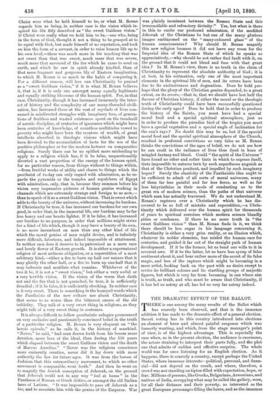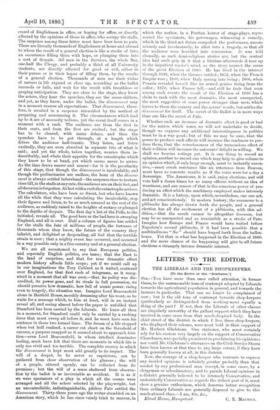THE DRAMATIC EFFECT OF THE BALLOT.
THERE is one among the many results of the Ballot which has scarcely been observed, and that is the immense addition it has made to the dramatic effect of a general election. Secret voting has in this country introduced into elections an element of keen and almost painful suspense which was formerly wanting, and which, from the stage manager's point of view, is of the highest advantage. This is especially the case when, as in the present election, the audience is enormous, the actors straining to interpret their parts fully, and the plot one that admits of sudden and effective surprise. The whole world was for once listening for an English election. As it happens, there is scarcely a country, except perhaps the United States, where immense interests—political, personal, and finan- cial—did. not depend on the result, and where, therefore, a crowd. was not standing on tiptoe filled with expectation, hope, or fear. Millions of persons, like Greeks, Bulgarians, Armenians, and natives of India, occupying what may be called the gallery, were, for all their distance and their poverty, as interested as the great European personages filling the boxes, and as the immense crowd of Englishmen in office, or hoping for office, or directly affected by the opinions of those in office, who occupy the stalls. The suspense among these latter must have been keen to pain. There are literally thousands of Englishmen at home and abroad to whom the result of a general election is like a stroke of fate, an occurrence filling them with hope, or plunging them into a sort of despair. All men in the Services, the whole Bar, one-half the Clergy, and probably a third of all University students, are directly affected for good or evil, either in their purses or in their hopes of filling them, by the results of a general election. Thousands of men see their vistas of careers in life expand or close up, according as the ballot succeeds or fails, and wait for the result with breathless or gasping anticipation. They are close to the stage, they know the actors, they hear the speeches, they see the scene-shifters, and yet, as they know, under the ballot, the deiwue»zent may in a moment reverse all expectations. That denouement, there- fore, is awaited in a suspense intensified by the method of preparing and announcing it. The circumstances which lead up to it are of necessity tedious, yet the event itself comes in a moment with a rush. The audience are from the first in their seats, and from the first are excited; but the stage has to be cleared, with many delays, and then the speeches have to be got through, at a length which drives the audience half-frantic. They listen, and listen excitedly, they are even absorbed in separate bits of what is said ; and yet the whole, taken together, wearies them in- describably, and whets their appetite for the catastrophe which they know to be at hand, yet which seems never to arrive- As the time draws nearer and nearer—for it is the peculiarity of this stage, that though the denouement is incalculable, and though the preliminaries are endless, the hour of the denoue- ment is always settled beforehand—the suspense rises to torture, rises till, in the stalls at any rate, the audience are on their feet, and all decorum is forgotten. At last with a rush the catastrophe arrives. The calculators, who have been so fluent, but who have known all the while that they were calculating the incalculable, stop their figures and listen, to be as much amazed as the rest of the audience, as suddenly raised to the heights of ecstasy or plunged to the depths of despair. The first day's list of the Polls, to the initiated, reveals all. The good hero or the bad hero is sweeping England, and all is over. Half a column of figures has settled for the stalls the fate of millions of people, the fortunes of thousands whom they know, the future of the country they inhabit, and delighted or desponding, all feel that the terrible strain is over ; that a mighty event has occurred, and occurred in a way possible only in a free country and at a general election.
We are all accustomed to say that European politics, and especially English politics, are tame; that the East is the land of surprises, and that for true dramatic effect modern history affords little scope; yet if we could call up in our imaginations the Tory Cabinet as it waited, scattered over England, for that first rush of telegrams, as it recog- nised in a moment that all was over,—that its policy was dis- credited, its power gone, and its rivals in fall possession, we should perceive how dramatic, how full of scenic power, rising even to tragedy, the situation was. Imagine Lord Beaconsfield alone in Hatfield House, moodily dreaming after his wont, as he waits for a message which, to him at least, will in an instant reveal all, and seeing almost before the paper is unfolded that Stamford has been carried by the Liberals. He knew all then in a moment, for Stamford could only be carried by a rushing force that must sweep all before it, and he must have seen his sentence in those two formal lines. The dream of a life stopped when but half realised, a career cut short on the threshold of success, a purpose snapped as it seemed about to approach frui- tion—even Lord Beaconsfield, in whom intellect dominates feeling, must have felt that there are moments in which life is only too vivid and too terrible. The complete secrecy in which the denouement is kept must add greatly to its impact. The will of a despot, be he never so capricious, can be gathered from close observation of his glances ; the will of a people, uttered openly, can be collected from its promises ; but the will of a mass sheltered from observa- tion by the ballot is as inscrutable as accident. It is as if we were spectators of a play in which all the scenes were arranged and all the actors selected by the playwright, but an uncontrollable, indistinguishable, pitiless Fate settled the denouement. Thirty-three years ago the writer stumbled on an American story, which he has since vainly tried to recover, in which the author, in a Puritan horror of stage-plays, repre- sented the spectators, his personages, witnessing a comedy, which in the third act Satan compelled the performers, uncon- sciously and involuntarily, to alter into a tragedy, so that all the audience were horrified into conversion, it was told clumsily, as such demi-religious stories are, but the central idea had such grip in it that a lifetime afterwards it rose up in the impatient reader's mind, as the story nearest the scene of the great Election of 1880. He has lived in the interval through 1818, when the thrones rattled ; 1852, when the French Empire rose ; 1860, when Italy sprang into being ; 1866, when Prussia revealed herself like an armed genius rising from the coffer; 1870, when France fell,—and still he feels that even among such events the result of the Election of 1880 has a claim to rank with the most dramatic, the most unexpected, the most suggestive of some power stronger than men, which leaves to them the scenery and the actors' words, but settles the denouement for itself. The secret of the Ballot is in more ways than one like the secret of Fate.
Whether such an increase of dramatic effect is good or bad for the nation which votes, we will not undertake to decide, though we suppose any additional interestingness in polities must be in a way good ; but of this we may be sure, that the power to produce such effects will increase the readiness to pro- duce them, that the consciousness of the tremendous effect of their volition will increase the autocrats' delight in willing. We shall see heavier votings yet. It is one thing to record an opinion, another to record one which may help to give volume to an opinion which, if only large enough, must be instantly execu- tive,—must crush resistance like an utterance from Heaven, must have as concrete results as if the voter were for a day a Sovereign. The Americans, it is said, enjoy elections, and will vote half a dozen times for as many officers without an idea of weariness, and one reason of that is the conscious power of pro- ducing an effect which the machinery employed makes intensely dramatic. It is a lottery, upon which, nevertheless, one can act, and act conscientiously. In modern history, the summons to a plebiscite has always drawn forth the people, and a general election has all the excitement of a plebiscite, with this ad- dition,—that the result cannot be altogether foreseen, but may be as unexpected and as irresistible as a stroke of Fate. Imagine how Europe and France would have waited before Napoleon's second plebiscite, if it had been possible that a multitudinous " No " should have leaped forth from the ballot- boxes. Yet that is what has happened in the Election of 1880, and the mere chance of its happening will give to all future elections a strangely intense dramatic interest.



































 Previous page
Previous page